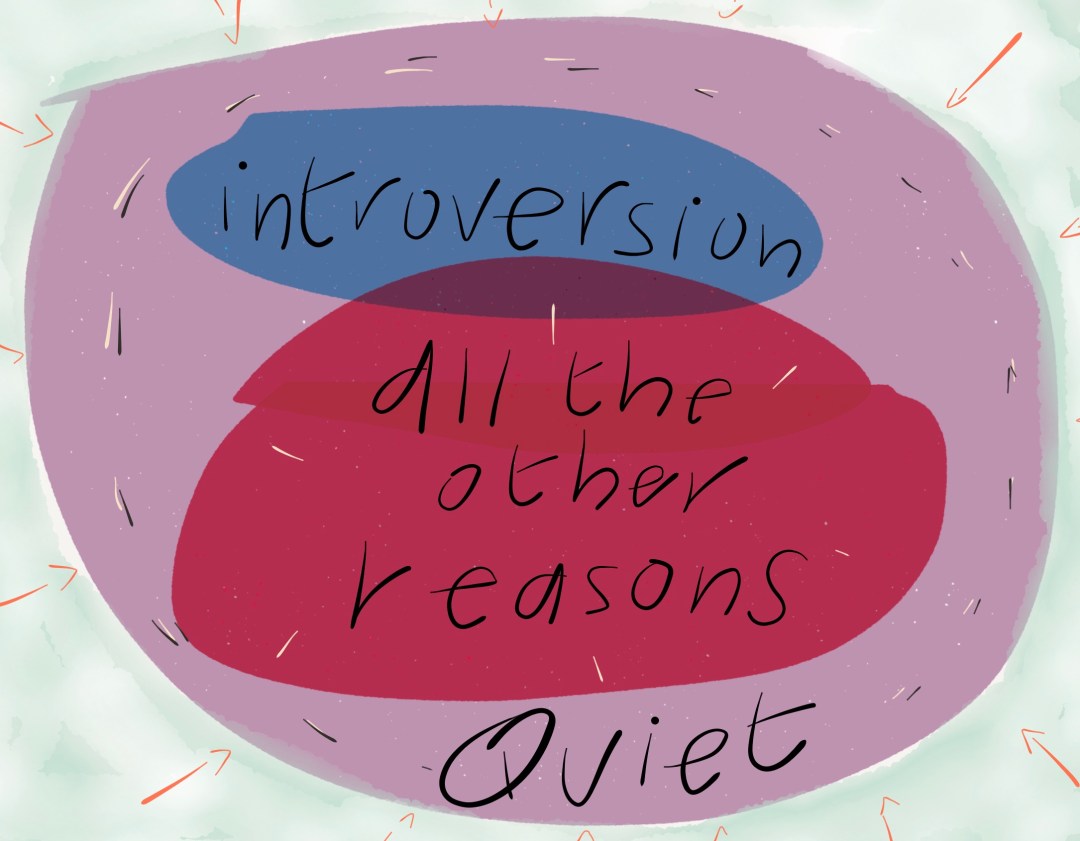I’m a Quiet person. Am I an Introvert – or what, exactly?
For some, quietness is a preference or a way of being. For others it could be a signal of pain or crisis. So many reasons we are, or become, quiet.


In 2015, driven by the observation that a large percentage of the people I work with are quiet ‘do-ers’ or quiet thinkers who struggle to raise their profile or get traction and visibility for their work, I wrote and published the Art of Shouting Quietly – a guide to self promotion for introverts and other quiet souls.
Not just shyness, introversion or lack of confidence…
Since then, I’ve noticed something else. Susan Cain’s seminal book, Quiet, placed introversion centre stage in the dialogue about quiet people and their potential. Indeed, in my work with quiet people – both as a coach and in my writing, introversion is a recurring theme. However, I feel that the focus on introversion and it’s conflation with quietness has a hidden danger – namely, masking the fact that people are quiet, or have become quiet, for very many different reasons. It is the work with ‘other quiet souls‘ that fascinates me most.
Working with the quiet souls
When people approach me for help with lack of confidence in self-promotion, fear of public speaking, or frustration with their own inability to stick their heads above the parapet, I’m immediately curious about the underlying nature of their quietness, how it manifests itself and whether there’s a straightforward reason for it or not. Is the person I’m working with quiet by nature or through force of circumstance?
In this article I’m going to think out loud about the things I notice. I’m going to try and tease out the complex interrelationships between quiet, introversion, shyness, lack of confidence and all the other things that conspire to hold people back.
For now, I thought I’d share just a few of things that emerge from my sessions. Sometimes, mind-bogglingly complex juxtapositions of causes, events and interventions conspire to drive an individual into quietness and inaction.
- Extremes of perfectionism.
- Aspects of Neurodiversity.
- Grief.
- Debt and other chronic worry.
- Bullying or being subject to manipulative behaviour.
- Post traumatic stress – diagnosed or not.
- Knowing they need help – and too scared to ask.
- The impact of ‘well intentioned’ criticism.
- Illness and pain.
- Exhaustion/given up/worn out with ‘trying’.
- Compassion fatigue.
- Misplaced parental ‘guidance’.
- Destructive teaching.
- Inability to acknowledge/internalise skills, ability and expertise.
- Inability to receive and properly process praise and positive feedback.
- Extremes of sensitivity.
These are just a few examples of what can be a very long list of things that act alone or in complex combinations to stop a person in their tracks.
Coaches use the iceberg analogy – our behaviours are driven by the invisible factors that sit beneath the surface of the waves.
Is the aim to release yourself from a prison of quiet or to learn to be a happy and effective quiet person?
The dangers of labelling
I’m not a great fan of attaching labels to people. Don’t get me wrong – they can be a useful device, but I don’t find them useful in my coaching work.
It’s too easy to think of people being on spectrums or continuums – on straight lines between extrovert and introvert or being extremely autistic or not at all so. These devices are hugely misleading.
The danger of classifying people and behaviours is that it’s an easy route – you do a diagnostic test and you find a label and it’s tempting to think that’s going to make life easier. The danger is that we see what we want to see, attach the label our thinking is biased towards, and fall straight into a trap.
In some respects, I’m a deep deep introvert. I like my alone time – lots and lots of it. I’m not comfortable making small talk – I feel like my tongue swells up and I get a sense of paralysis. Put me in front of an audience with a clear brief and some great slides and all my energy comes to the surface and I feel joyfully connected. How does that work, then? Am I extrovert, ambivert, introvert or what?
The truth is we all pop up in many different places on our own unique existential scatter graph of introversion, confidence, flow, joy, energy – so many variables… I could go on, but I’m sure you see what I mean. The moment we try to compare ourselves to someone else, we’re stuffed. I don’t now about you, but I don’t want to be ‘understood’, I want to experience empathy. And I think my clients feel the same. It’s the ‘being with’ that counts – not just the listening, or the exemplary reading of body language, or the mirroring or the incisive questions.
What am I trying to say here?
Change is the norm. I sometimes see people’s conscious perception of themselves change in an instant. What I’ve not had the luxury of seeing is all the cogitation that’s been going on under the surface that’s led them to that point. Nor, as coach, should I be arrogant enough to take the credit for transformational change when it does happen. It may, or may not, have been a result of my fabulous work.
“Learn your theories well but put them aside when you confront the mystery of the living soul.” Carl Jung
As I move through my work with people – some of whom tell me they are quiet or shy or introverted or lacking in confidence – I’d like to invite you also to question how and why we label people in the way we tend to do – and not fall into the trap of labelling yourself. It’s really all about finding out what works for you.
New Course: ‘The Quiet Person’s Guide to Getting On’

I’ve just launched a new course especially for people who need to more fully understand the reasons for their quiet nature, and get some helpful strategies – you can find out more here.
In this workshop I offer an opportunity to put your quiet nature into context and reframe it as an advantage rather than a hindrance.
We’ll explore the whole ‘scatter graph’ of quiet – shyness, social anxiety, introversion, lack of confidence etc., and learn how we can re-contextualise our quietness and get out of the trap of trying to mimic more extrovert behaviours. A lot of the pain that quiet people suffer is caused by pressure from others to conform to social norms.
Quiet can be a sanctuary – and it can also be a hiding place. Are you content with your quiet self, or are you in need of more mobility in your thoughts and actions?
Footnote:
I write about quiet from the perspective of being an introvert myself. My Dad was an introvert – some of these traits can be inherited. My own introversion, however, was amplified by the trauma of childhood pain and illness and a messy near-death experience.
How to find out more
I coach quiet people. If anything I’ve mentioned here strikes a chord with you, please do get in touch. Or leave a message on 07810 415402 and I’ll get back to you. I also run workshops and masterclasses for organisations that want include quieter team members, help them flourish and gain from their amazing quiet insights.
If you have enjoyed this article, please feel free to share it – and do follow me on Twitter @petemosley
Cheers! Pete
P. S. I create hand illustrated coaching cards and tools – have a look here.
Pete Mosley PCC
Coach/Speaker/Writer
I work with quiet, thoughtful and purpose-driven individuals to help build confidence in both life and work, for example by supporting them to find a voice, speak up, pitch or talk in public without feeling intimidated by louder voices. As a reflective person myself, I'm drawn towards working with others who find the cut and thrust of everyday life to be a challenge. I also help business owners work out how to promote themselves and build an audience for their work. I'm a graduate of the acclaimed Barefoot Postgraduate Certificate in Business & Personal Coaching, and I now teach for Barefoot. My book - The Art of Shouting Quietly - a guide to self-promotion for introverts and other quiet souls – has sold in 25 countries around the world. I'm very experienced - I have 15 years of track record as a mentor in the Creative Industries prior to training as a coach in 2008. Please don't hesitate to get in touch - I'm always happy to talk with you about coaching/mentoring on the phone - with no obligation.


